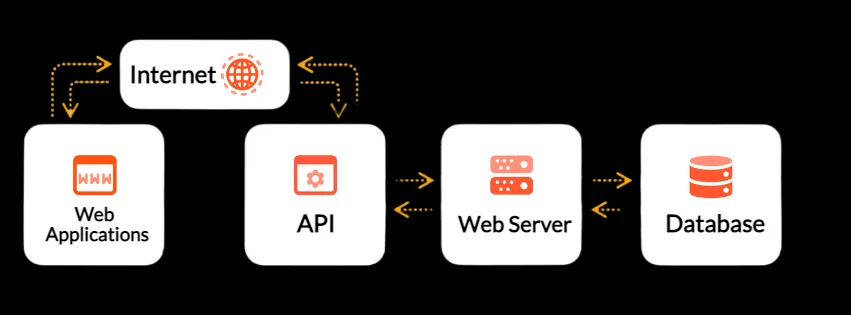The term “API” can be intimidating to beginners. It's not a word you hear very often. In fact, if you don't work in computer programming or software development, there's a good chance you won't have ever heard of it before. However, Application Programming interfaces are becoming more and more important as the internet continues to evolve and mature.
APIs are essential for creating applications that interact with websites and services, whether those services be your own site or a third-party service provider. An API is essentially a set of rules that governs communication between two separate programs or systems.
From a user perspective, an Application Programming Interface is a code that allows them to leverage their privileges from one system to access other system from within their own application or website. In other words, an API makes it possible for one program to talk to another program, like a secret door into another virtual room.
What is an API? Defining an API

The simplest way to understand an API is to think about it as a door. When there is an API, one system has a door that leads to another system. That second system is like a wall, it cannot be accessed by itself. So, the two systems are essentially two houses that are next to each other. Without the door, there wouldn't be an easy way to transfer information between these two systems. An API is a set of rules and definitions that govern how one program can interact with another.
This essentially means that one program can tell the other program what to do and get information back. APIs can be public or private, depending on how secure it is.
What are APIs used for?
APIs are used for a variety of purposes. One of the most common uses for APIs is to make data transfer more seamless between two separate programs. For example, you might want to pull data from a third-party feed like Twitter or Instagram into your online marketing platforms like HubSpot or Marketo.
A data feed API makes it possible for one program to access and integrate data from another program. Another everyday use for APIs is to integrate software functionality. Let's say you have a booking engine for your hotel, and you want to enable customers to book rooms through their website. In this case, an API allows the hotel booking engine to communicate with the website through an Application Programming Interface to enable customers to book their room right through the website without even having to have the booking engine installed on their computer.
APIs are also used to create mashups of data and content from various different sources or to integrate other software platforms within an organization. For example, you might have your company's CRM in Salesforce and use their API to connect it to your marketing automation software like HubSpot or Marketo.
Why should you Care about APIs?
There are a few reasons why you should care about APIs. First, it's increasingly important to understand how APIs work. APIs are the building blocks for developing applications. They allow you to access data from other websites and applications, which is essential for creating modern digital experiences.
In fact, APIs are one of the primary building blocks for the endless sea of consumer-facing apps and services that we see today. If you want to create a digital experience that you can share with others, you need to understand APIs.
Application Programming Interfaces are also a vital part of modern marketing. APIs are an essential tool for marketing tactics like lead generation, email nurturing and social media marketing campaigns. APIs can help you integrate different platforms and automate marketing processes. This can help you scale your marketing efforts while also saving time and money.
In the end, APIs are here to stay. They're a crucial part of developing applications, as well as marketing initiatives. The sooner you understand how APIs work, the better prepared you'll be for the future.
What can you do with an API?
There are many ways that you can use an API to your advantage. Here are a few examples of how an API can help your business.
- Create an Automated Customer Experience- One of the most common uses for APIs is to create an automated customer experience. For example, you might want to integrate a customer support ticketing system with your help desk software.
- Connect Multiple Tools- APIs are also outstanding for connecting multiple tools. If your business uses several different tools and services, APIs can help you link them together.
- Develop Custom Software- You can use APIs to develop custom software. This is especially helpful when you want to create a unique experience for your customers.
- Send Data Between Systems- If you have two separate systems, you can send data between them using an API. This is useful in cases where you need both systems to talk to each other.
Final Words: Understanding API
APIs are an essential tool in the modern business toolkit. If you want to create custom software, create an automated customer experience or scale your marketing efforts, APIs can help. You may have heard the term “API” being tossed around a lot, but if you don't work in software development, there's a good chance you are unfamiliar with this term.
An API is essentially a set of rules that governs communication between two separate programs or systems. APIs are quite a deal in the modern world and undoubtedly are becoming more prominent with each passing day.
